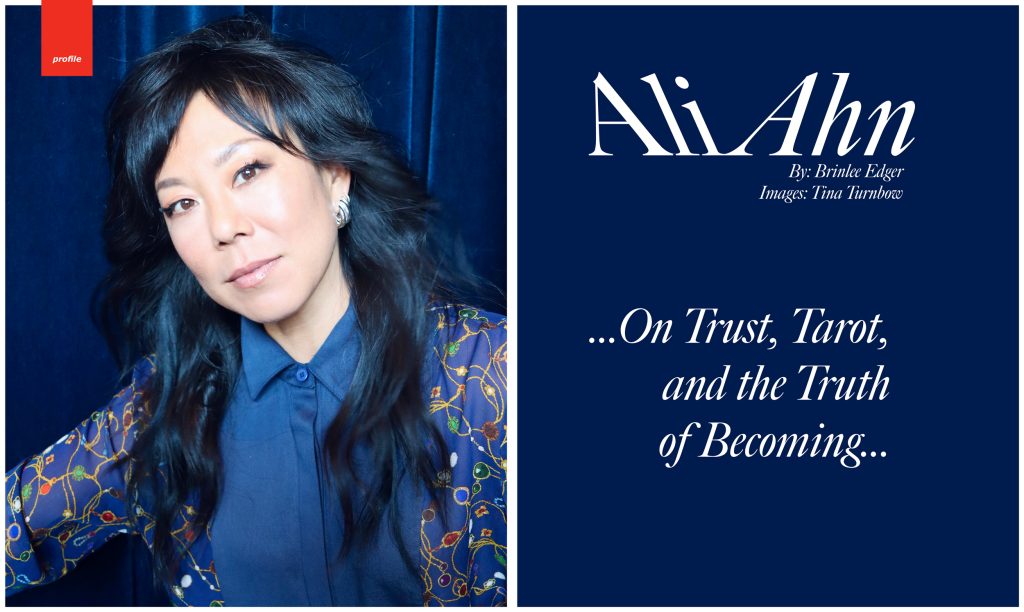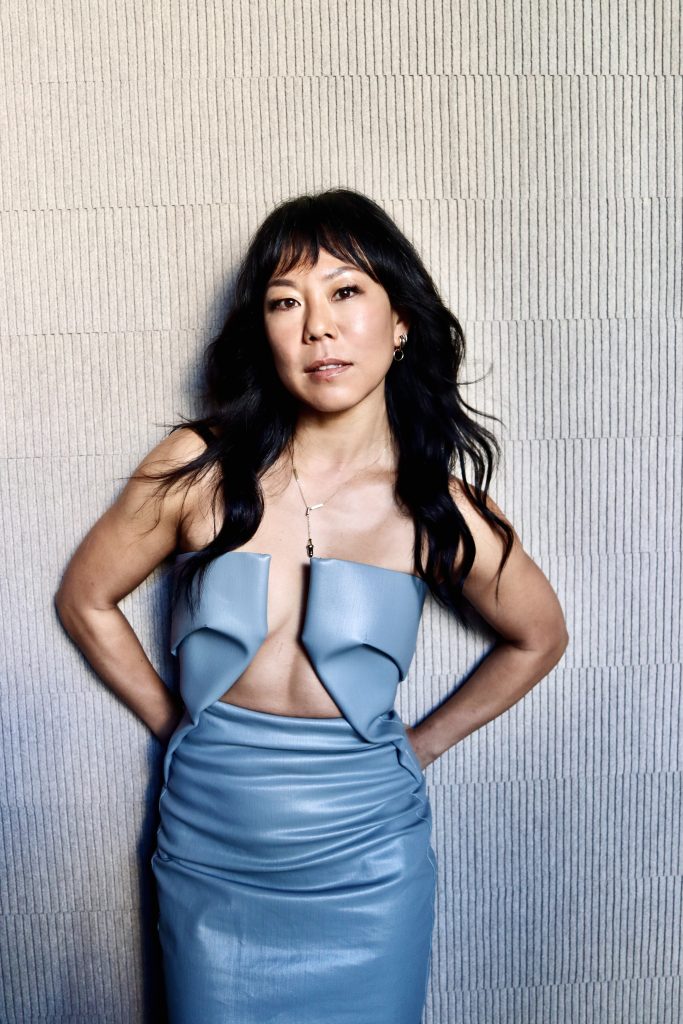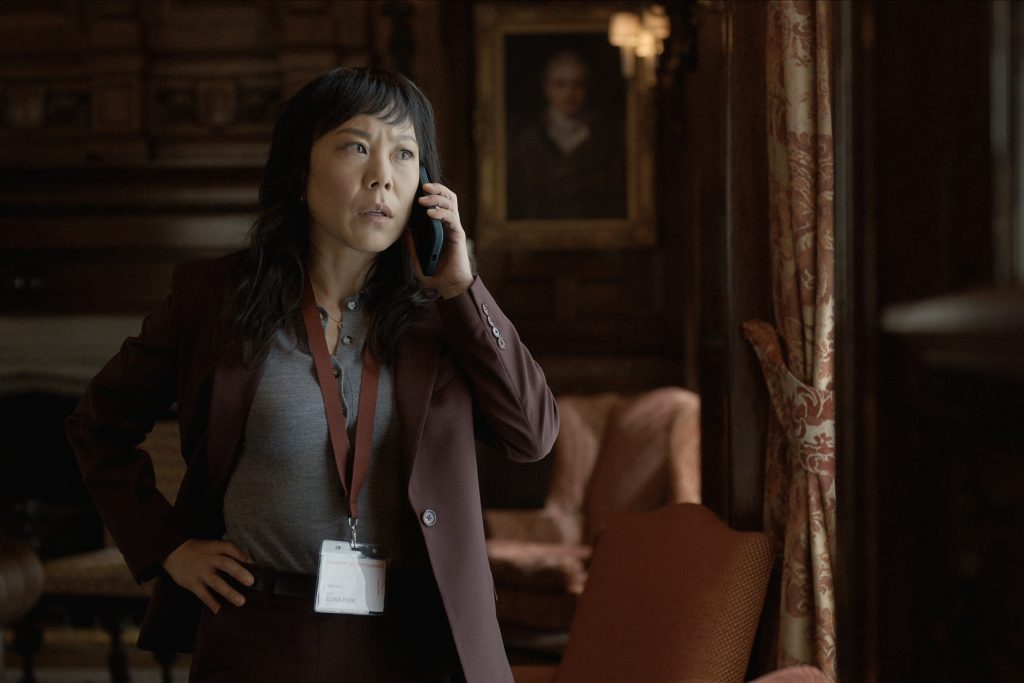 Don’t forget to check out the latest issue of Moves on Issuu!
Don’t forget to check out the latest issue of Moves on Issuu!
By Brinlee Edger
Photos by Tina Turnbow
When Ali Ahn joins our call, she’s laughing before the recorder even starts. There’s something immediately unguarded about her: curious, warm, slightly self-mocking. It’s not hard to see how she’s built a career on presence, on finding truth in the in-between moments.
“I’ve always had a little bit of the woo in me,” she says, describing her fascination with tarot cards. “When you don’t have control over a lot of things, you learn to surrender. It’s practice.” That sense of surrender has shaped much more than her spirituality. It’s become the quiet engine of a career that’s taken her from late-night acting classes in New York to scene-stealing roles in The Diplomat, Raising Dion, and Marvel’s Agatha All Along.
Netflix’s The Diplomat, which also stars Keri Russell, Rufus Sewell, and Allison Janney, pushed Ahn into a new orbit. As Eidra Park, the CIA’s head of station in London, she plays a character defined by restraint whose calm is both armor and strategy. Season 3 premiered on October 16.
“My manager called and said, ‘You’re getting an offer.’ I thought he meant a guest spot. When he explained it was a series regular, I said, ‘Wait—are you sure they have the right Ali?’”
Showrunner Debora Cahn had watched all her past work and offered the part based on a small, easily overlooked guest role Ahn had done years before. “She told me that was the one that convinced her,” Ahn says. “It was on a Bravo-scripted show that probably five people saw. That kind of attention floored me.”
Stepping into the role, she found power in subtlety. “Eidra’s strength is her control,” Ahn explains. “Her weakness is that same control—her emotional compartmentalization.” By season two, the walls start to crack. “You see more of her humanity,” she says. “The humor, the doubt.”
When asked what keeps Eidra so sharp, Ahn grins. “The suits. They’re so tight and high-waisted you literally can’t slouch.” Ahn laughs when she calls herself “a spiritual person with practical shoes… We’re all made of the same material,” she says. “We’re made of stars. If the moon can move the ocean, of course it can move us.”
During the filming of Agatha All Along, she started drawing a tarot card each morning before heading to set. “It wasn’t about predicting anything,” she explains. “It was just something to frame the day—a way to stay open.” That small ritual echoes the way she approaches acting: as a mix of preparation and letting go. “You do your homework, and then you have to release it,” she says. “You can’t force the universe—or a scene—to behave.”
Even though growing up for Ahn was in the Los Angeles area, acting wasn’t even on the table. “I didn’t think it was a real job,” she admits. “I was a little Asian-American kid from an academic family. There weren’t examples of people who looked like me doing this for a living.”
Still, she couldn’t stay away. “My school had this incredible drama program,” she recalls. “I loved the feeling of disappearing into a story.”

After college, Ahn did what many uncertain twenty-somethings do: she tried to be sensible. “My parents thought I’d be a lawyer,” she says, smiling. Instead, Ahn negotiated with her parents to live in New York for the summer, work during the day, take LSAT classes on weekends, and attend acting classes at night. Halfway through the summer, she broke. “I called them crying from a closet at my day job and said, ‘I can’t do this. I just can’t.’” Ahn spent years juggling day jobs and auditions, always half-convinced it would all vanish. “Even when I started working on sets, I’d bring my laptop and do my other job between takes,” she says. “I just couldn’t believe it would last.
“I lived in this illegal basement where people came down to do their laundry in what was technically my living room,” she says, laughing. “My sister visited once and texted her friend, ‘She’s lost it.’ But I wanted it that badly. You do what you have to.”
Her first major break came when she booked a Broadway play, a dream she’d never dared to have. “I’m not a musical actor, so Broadway felt out of reach,” she says. “But I got this role that wasn’t written for an Asian actor. It was the first time I spent more hours acting than working my side job.” That production changed everything. “Friends who’d been checking in for years were suddenly flying to New York to see me,” she says. “It made me feel like, okay, maybe I’m not completely delusional.”
It also gave her something she hadn’t had before: proof. “You don’t need fame to feel like you’ve made it,” she says. “You just need a moment where the work feels real.”
For all her success, Ahn still talks about her career with disbelief rather than triumph. “I play confident people, but that’s not always me,” she admits. “Believing in myself has never come naturally.”
It’s a rare confession in an industry that rewards polish. Yet it’s also what makes her magnetic. “I still feel like a struggling actor most days,” she says. “My partner has to remind me, ‘You’re okay. Things are good.’ But part of me is always waiting for the rug to get pulled out.”
Lately, she’s been trying to look further ahead. “For the first time, I’m thinking about what the next ten years might look like,” she says. “Maybe writing, maybe producing, something that lets me help shape stories instead of just stepping into them.”
People have been telling her to write for years. “Apparently even my emails sound like scripts,” she jokes. “But it’s terrifying. I have so much respect for writers. It’s not just being clever, it’s finding the story that means something.”
Still, she’s drawn to the idea of creating more complicated, less polished female characters, especially Asian women. “In Hollywood, we often stand in for skill, for composure,” she says. “But I want to see messy women. Flawed, funny, contradictory ones. That’s what’s real.”

Ali Ahn as Eidra Park in The Diplomat. Courtesy of Netflix © 2025
At the end of our conversation, Ahn gamely agrees to a rapid-fire round. Park’s weakness? “Emotional compartmentalization.” Favorite food? “Whiskey.” The most intense day on set? “When Keri Russell got COVID and production asked if I could film all my phone call scenes for the entire season in one day. We hadn’t even read the last episodes yet. I just said, ‘Sure, why not.’ And we did it.”
She laughs, but the story lands like a metaphor: say yes, figure it out later. It’s a pattern that’s carried her from basement apartments to London soundstages, from uncertainty to something close to faith.
As we wrap, Ahn thanks everyone on the call with quiet sincerity. “I know what it’s like to hustle,” she says. “So every time I get to talk about the work, it feels like a gift.”
Maybe that’s what the tarot cards were trying to tell her all along: trust the pull, even when you can’t see where it’s leading.
